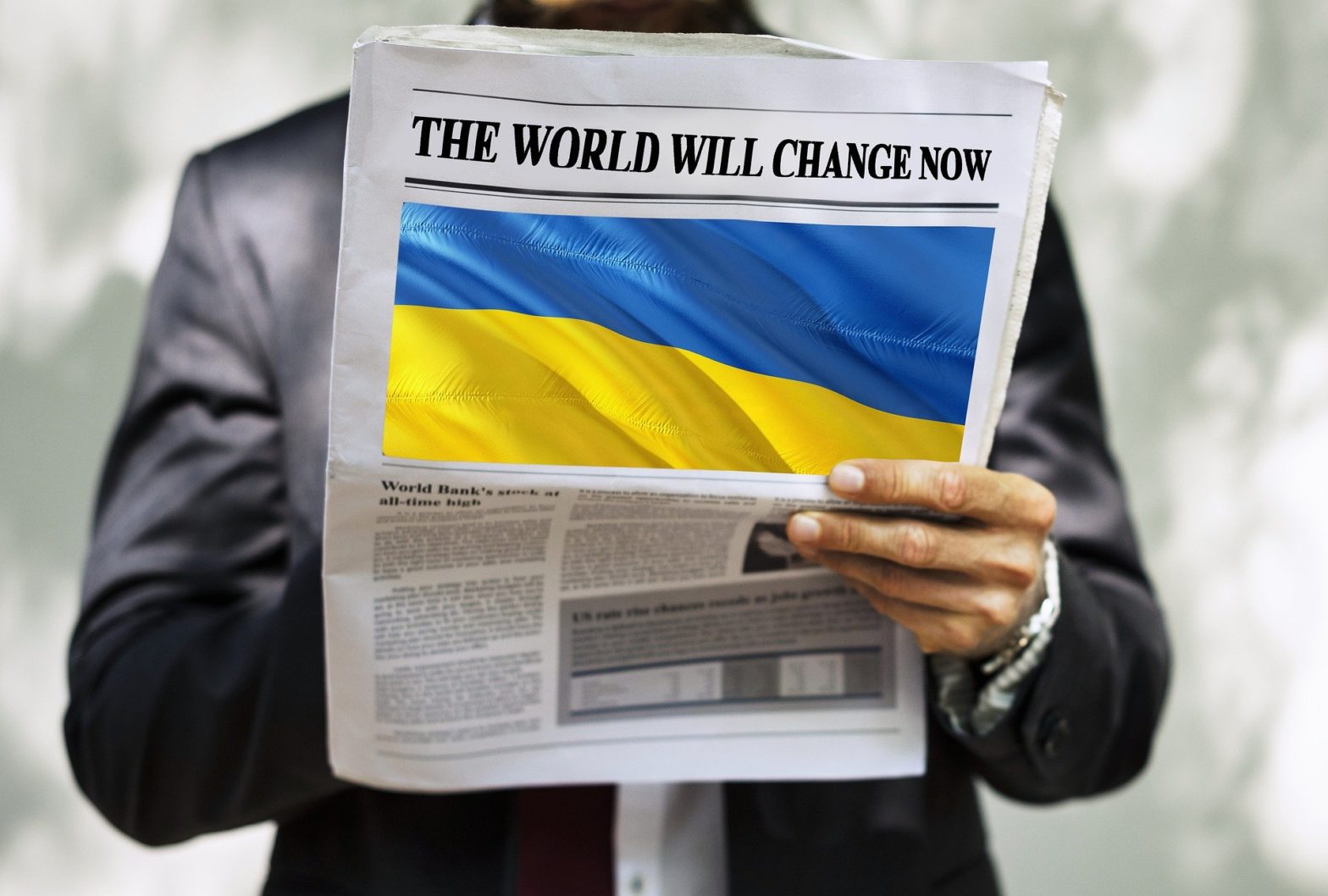Time to rethink
Russia started its invasion of Ukraine early in the morning on 24 February 2022. The region became in the spotlight of the global media practically in the blink of an eye, starting a marathon of news coverage that has unfortunately not ended until now. American CNN is certainly no exception, which is logical given its position of a news giant. However, on the very first day of the conflict, the broadcaster came in for criticism that did not relate to the coverage itself but to the fact that the broadcaster had not sufficiently revised its complementary activities. What was it all about?
Squeezeback ads were the problem. A squeezeback ad is a short advertising format consisting of TV shots or special graphic presentation and usually takes no more than ten seconds. It mostly appears in a certain section of the screen alongside the current broadcast. It is a Solomonic solution giving sponsors visibility of their brands in the continuous broadcasting while keeping the attention of viewers watching the ongoing broadcast. For this reason, it is applied predominantly to sports broadcasts.
However, on 24 February 2022, CNN’s broadcast was dominated by air attacks on Ukraine and shots of depopulating Kiev. Viewers were thus shocked when the news were disrupted by a light-hearted spring spot of Applebee, the US franchise restaurant operator. A spot showing chilled cider, people enjoying the usual American dinner and a twerking cowboy appeared on the screen simultaneously with the live coverage. In another moment, a spot for the Sandals holiday resort ran on the same place together with a background musical theme of Bob Marley’s “Everything’s Gonna Be Alright”.
Video: Applebee’s Squeezeback Ad disrupts the live coverage on the war on Ukraine
CNN responded promptly and temporarily removed all squeezeback ads from its broadcasting. Nevertheless, this opened up a debate on how global companies should react adequately to the situation. Moreover, all this occurs in the first quarter of the year when spring marketing campaigns are traditionally running. But there is not much space left to welcome the spring - namely because consumers believe that firms should definitely not ignore the situation in Eastern Europe.
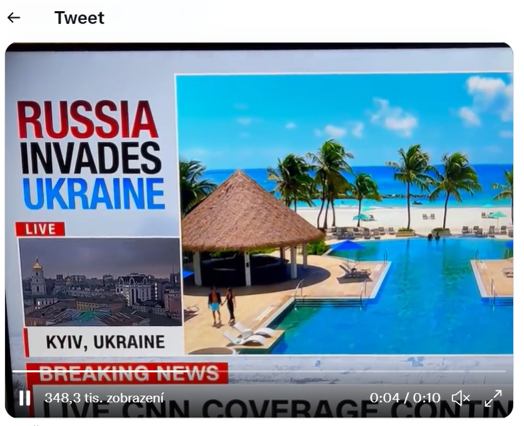 Video: Sandals Squeezeback Ad disrupts the live coverage on the war on Ukraine
Video: Sandals Squeezeback Ad disrupts the live coverage on the war on UkraineStaying silent is not an option
Marketing experts believe that most of the consumer public pays more attention to what is going on in Ukraine, expecting the same from its favourite brands that should definitely react in a certain way. Staying silent is not an option. Markets also have memory and many firms might pay for their silence in the long run. Now is the time to tell what values the firms appreciate as in the future, they might face an increasing number of questions why they failed to do so.
“People are placing increased emphasis on what their employer or other companies are doing to help in the current crisis situation. I think they will equally remember the views they held when the war started,” points out Michelle Giuda from the Weber Shandwick PR agency. “However, companies should first and foremost think about the impact and weight of their activities in relation to the gravity of the situation. Not just about how these activities will be perceived,” she warns.
In the first days of invasion, the UK retail chain Tesco was among those who responded by donating a million pounds to help Ukraine. Its competitor Sainsbury’s went even further and modified the branding of its Chicken Kievs to Chicken Kyiv. Bidfood, which is active in the Czech Republic, reacted similarly – its traditional Russian ice cream in now only available as Ukrainian ice cream. Solidarity with the attacked Ukraine has become the key topic of all marketing activities. And it has had very diverse forms.
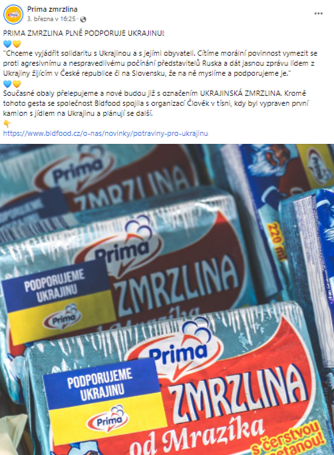 FB post: Ukrainian ice cream
FB post: Ukrainian ice creamOn 24 February 2022, social networks were literally taken over by Ukrainian national colours - yellow and blue. The following day, on Friday, 25 February, the title pages of most Czech popular dailies were designed making a creative use of the two colours. Also the most popular Czech search engine, Seznam.cz, added a coloured ribbon to its logo after the outbreak of the war. A number of logos that customers are familiar with continue to get a new blue-and-yellow facelift. Cryptocurrency exchanges have also responded, experiencing an unexpected shock as a result of Russia’s invasion of Unkraine. Crypto Portal, Prague’s NFT gallery, auctioned off a NFT work “Good Samaritan”. Unsurprisingly, the creative design in this case is again based on the blue and yellow duality.
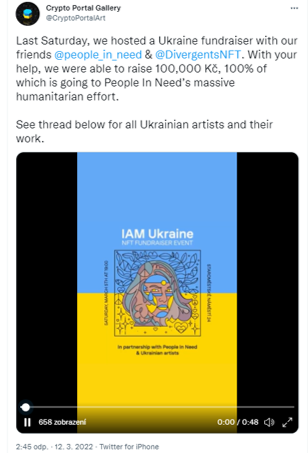 Video: Crypto Portal fundraiser for Ukraine
Video: Crypto Portal fundraiser for UkraineHelp is provided on both global and local levels
With a little exaggeration it can be said that what matters now is on which side of history individual brands will stand on. Some companies have recently decided to completely withdraw their products from Russia, including the tech giant Apple or the fashion giant Nike. They are certainly not the only ones, a number of companies have taken a similar step. But responses also come from substantially smaller players. In many cases they are of a local nature but they are no less inspiring. Most often, these activities have the scope of charitable and humanitarian support.
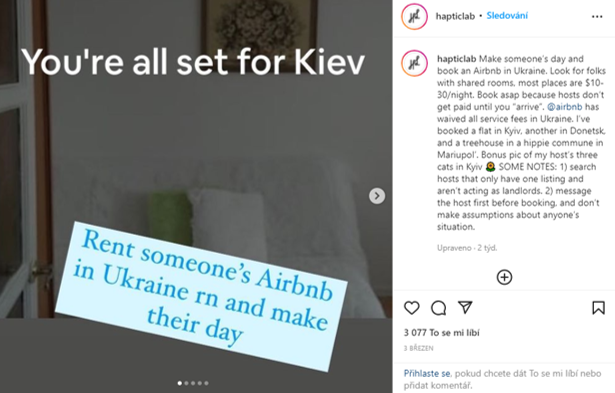 IG post: Haptic Lab call
IG post: Haptic Lab callFor example, Haptic Lab, a design studio seated in Brooklyn, New York, called its customers to book accommodation offered by Ukrainian users through Airbnb to provide them with financial support. In the local context, we can mention Prague Zoo launching the sale of charitable entrance tickets. They are symbolic in general, but customers can donate up to CZK 2 thousand by buying the tickets to support breeding facilities in the war-affected country. A number of companies partner with charitable organisations - in the Czech Republic, these include the largest commercial TV networks Nova and Prima, the public broadcaster Český rozhlas, the forwarding company Zásilkovna, the mobile operators O2 and Vodafone, and the largest Czech car manufacturer Škoda Auto. This company has even organised its own employee charity collection. These are just several drops from the sea. The entire free world seems to stand firmly behind Ukraine.
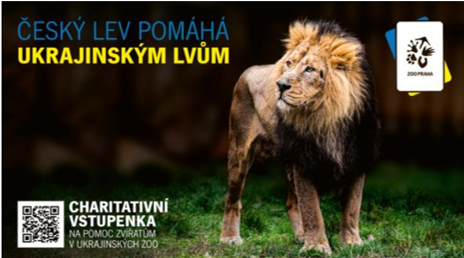
Photo: Charitable Prague ZOO ticketDepositphotos, the portal that is one of the most popular internet photo and video banks, made an effort to create a special photo collection to show the only thing - undistorted reality of what is going on in Ukraine. In this manner, the portal wants to fight against spreading misinformation. The Etsy social platform brings together small artists and creative designers using this platform to offer their products to anyone who is interested. Under normal circumstances, the platform charges a mediation fee. Now, it has made a decision to exempt the community members hit by the conflict from the fee.
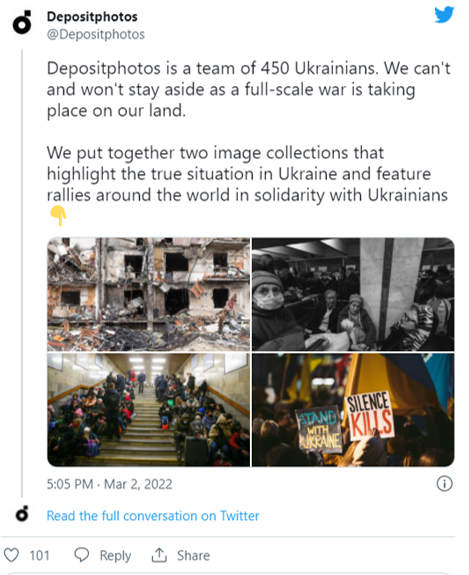 TW post: Depositphotos – collection of photos on the conflict in Ukraine
TW post: Depositphotos – collection of photos on the conflict in UkraineThe above-mentioned Airbnb has offered free temporary accommodation to up to a hundred of refugees during the crisis and has actively cooperated with special agencies all over the world seeking to ensure that war refugees are cared for. In short, the situation leaves nobody cold, which experts say is a good thing. Robert Gibbs from Bully Pulpit Interactive is of the same opinion. “First of all, companies should be aware that they are the key part of the Western response to what is going on in Eastern Europe. Now it is not the time to style yourself as a bystander,” he believes.
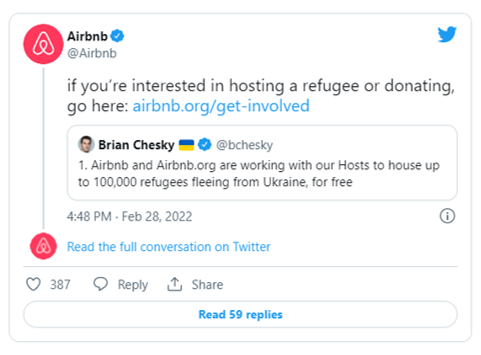 TW post: Airbnb call
TW post: Airbnb callMarketer = leader?
At the moment, companies should not just think about the impression they have made outside of their organisations. The current situation reveals another, rather less stressed, aspect of corporate marketing. Companies practically lack a strong instrument to make an inward impact - marketing should not only address prospective consumers but also represent employees and make anything to support them. It is absolutely crucial that employees are aligned with the steps taken by top management. They should understand the steps. And marketers can now present themselves as leaders.
“The current situation sets a serious precedent. As business leaders respond to the crisis, they are creating a model that will be required in similar situations in the future,” says Michelle Guida. The above-mentioned activity of Depositphotos may serve as an illustrative example. According to Depositphotos’ representatives, the collection of photos called “Say No to War” is intended primarily to support nearly five hundred of its employees from the vicinity of Kiev.
The outlined trend is visible predominantly in the energy and technology segment as Ukraine is a strategic signpost between two large global markets - European and Asian. Companies across the world have a number of their employees in the place of the conflict who have found themselves in the first line. According to Pitchbook’s data, 126 major global tech start-ups have their branches and employees in Ukraine. For example, the German company sceel.io operating under the umbrella of its parent company Sigma Software resolved to respond in the first days of war.
What were the specific measures? The company wanted to immediately evacuate its employees from the headquarters in Kharkiv but it was not possible due to the escalating situation. In fact, all efforts led to a rescue mission. At the end, however, the existing activities in the region will have to be reviewed. The company also has to deal with the fact that some employees will join the active resistance against Russian military forces. “The global military community should loudly express its indignation resulting from what is going on in Ukraine,“ said Mike Hahn, co-founder of Paygo Energy at the early days of invasion. And other people have joined him loudly one after another.
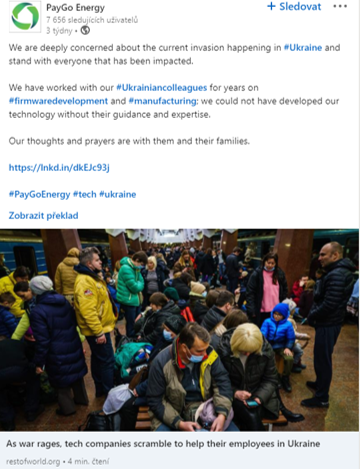 LinkedIN post: statement of Paygo Energy
LinkedIN post: statement of Paygo EnergyAstratex is one of the Czech firms that had to leave Ukraine. Its management also came to help and funded the relocation of the families of some of its employees, including providing them with accommodation for people in need. Number one in fast food, McDonald’s, keeps paying salaries to all of its employees in Ukraine. In addition, the company donated five million dollars and joined local charitable activities of the Red Cross.
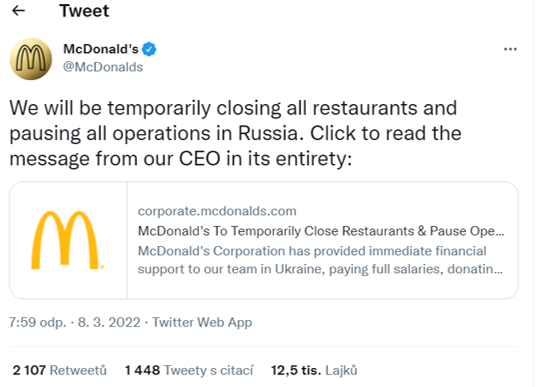 TW post: McDonald’s statement
TW post: McDonald’s statementThe luxury brand LVMH Moët Hennessy Louis Vuitton suspended all of its activities in Russia to express its protest - but it stands behind its employees out of solidarity, planning to continue to pay them their salaries.
In general, many companies leave Ukraine with the main reason being employee safety. Help in evacuation is no exception, it is rather a rule. For example, the Czech online supermarket Rohlík.cz organises large-scale transfers of families from the war-torn country.
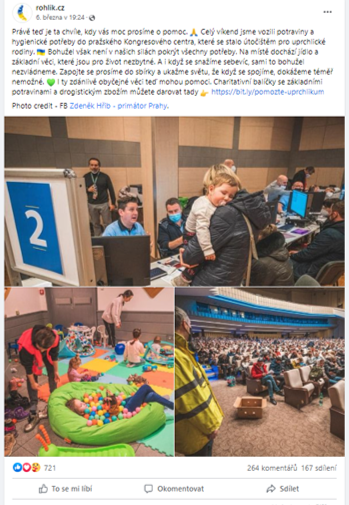 FB post: Rohlík.cz helps refugees
FB post: Rohlík.cz helps refugeesAdvertising time for humanitarian efforts
Organising charity collections and redirecting marketing channels and activities so that their content responds to the situation while appealing to the ideals of humanism, solidarity and help are specific and appreciated activities of companies, non-profit organisations and other private and public players. We do not have to go far for examples of good practice - Česká spořitelna has recently presented one.
Video: campaign of Česká spořitelna – Today we are stronger, today we help
The campaign was produced in cooperation with the non-profit organisation Paměť národa (Memory of Nations) and runs under the headline “Today we are stronger, today we help support the collection ukrajina.pametnaroda.cz”. One of the easy-to-remember elements of the campaign is the video spot building on not exactly pleasant nostalgia. The authors of the clip visited contemporary witnesses who personally experienced invasion of Czechoslovakia by the Warsaw Pact army in 1968. The video shows the parallel of the historic events with what is going on just several hundreds of kilometres from the Czech Republic. The spot - and the entire project - was produced within a record time, during a single day. Česká spořitelna did not make the mistake of long contemplation of what is the appropriate response and simply responded. The result in impressive - it is both moving and urgent.
Video: AKA campaign – We stand behind Ukraine
The Czech Association of Communication Agencies (AKA) responded in a similar vein. Its members launched a campaign “We stand behind Ukraine”. A short video was produced as part of the campaign featuring people affected by the war. Although the spot itself does not contain any scenes of war reality, it is full of personal experience of people whose lives have been shattered by the war. The campaign’s objective is a viral reach and as active distribution of the video among ordinary people as possible. This is appreciated by a number of powerful brands. They decided to provide their advertising broadcast time on TV screens for free for these purposes. We are talking about giants such as Ikea, Tchibo, Plzeňský Prazdroj, Staropramen or mBank.
Video: Campaign Kooperativa – Help for Ukraine
This is a trend that can be seen quite often. One of the largest Czech insurers, Kooperativa, started a new partnership with the platform Pomáhej Ukrajině (Help Ukraine). It is a hub bringing together all those who want to offer their help for the benefit of humanitarian efforts. A simple blue and yellow spot with Alexandr Hemala’s voice-over is intended to reach as large audience as possible. As a result, viewers should learn that such a platform is available. Kooperativa makes use of its background that is undoubtedly more stable and actionable than that of non-profit and charitable organisations.
As has already been said, solidarity and support is taking on unprecedented and colourful dimensions these days. It is apparent however that the trend is not temporary. It will change our perception of marketing and public relations going forward. Dreams of a peaceful spring have vanished, there is still no return to normal. On the contrary, we will have to wait for it at least another year. It is a challenge not only for the leading global companies but for all of us. After all, we are all in this together.

